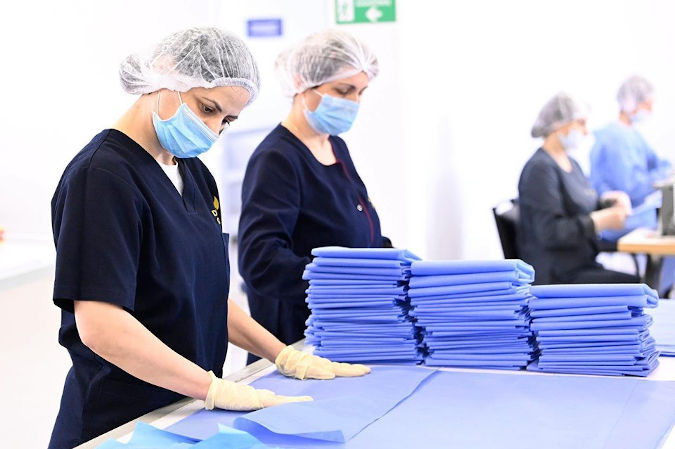Press Release: “Women and girls are left behind in COVID-19 response” – warn women’s organizations
Women’s organizations across Eastern Europe and Central Asia urged governments and development partners to recognize the unique and vital needs of women and girls in pandemic response and recovery efforts. Activists warned the international community that the world risks a roll back in women’s rights if necessary efforts are not urgently undertaken.Date:

(Istanbul, 29 April) – 128 women’s organizations and activists from 17 countries and Kosovo[1] called upon governments and development partners to ensure effective dialogue with civil society to put women’s needs at the centre of COVID-19 pandemic response and recovery efforts.
In Central Asia, Eastern Partnership and Western Balkans and Turkey sub-regional consultations, organized by the UN Women Regional Office for Europe and Central Asia, women’s rights activists highlighted the various challenges women and women’s organizations are facing during the crisis and offered solutions to address pressing issues. Participants included women’s organizations and activists already working on the front lines of COVID-19 response.
“Women’s organizations and civil society at large should be an integral part of COVID-19 response and recovery efforts. Since the beginning of the pandemic, they’ve been on the front lines, working day and night to respond to the needs of all groups of women and girls, men and boys. They know what needs to be done and we urge all development partners to seriously consider the solutions they offer so that we can continue to ensure the principles of equality and social justice” said Alia El-Yassir, the UN Women Regional Director for Europe and Central Asia.
Women’s organizations stressed their lack of engagement in national COVID-19 response and recovery planning as a key challenge that blindfolds current efforts in responding to the urgent needs of women and girls. They highlighted the need for their oversight and monitoring of COVID-19 actions and spending. Women’s organizations also emphasized the need for gender disaggregated data and statistics to paint a clear picture of women’s challenges during the crisis, which would pave the way for gender-responsive policy-making. As persistent issues that carry a potential to roll into bigger problems down the line, women’s organizations highlighted restrictions in women’s rights and access to justice, increases in women’s unpaid work at home, and loss of employment and income by women, who globally dominate insecure and informal economy.
All the women’s organizations are gravely concerned that social distancing and lockdown measures have triggered additional risk of domestic violence. In Kazakhstan and other countries, there are concerns that women cannot call police due to proximity of the perpetrator, so incidence is likely to be even higher than reported. In Turkey, 21 women were murdered during quarantine between 11 and 31 March[2].
Women’s organizations also stressed the need to create an enabling environment for civil society to operate in during and after the pandemic. “Even before the crisis, we faced the problem of shrinking space for civil society, especially for women’s groups. Now it’s worse. I’m afraid civil society organizations will disappear from the scene because of the funding cuts for human rights work which will affect the services we are providing,” said Diana Šehić, representing “Rights for All” organization in Bosnia and Herzegovina.
Each woman brought their own unique perspective from working with diverse groups of women and girls, some being at most risk of being left behind during COVID-19, including older women, women with disabilities, women living with HIV, women refugees and migrant and rural women.
“Engagement in informal work, lack of civil registration and challenges to access social services make Roma women invisible for state institutions during the COVID-19 pandemic. They ask for assistance but are not counted in the official database as employees who lost their jobs, nor as beneficiaries of state social aid,” said Manjola Veizi from the Roma Women’s Rights Centre in Albania.
Women’s organizations provided the following recommendations to governments for more gender-responsive efforts to respond to the pandemic:
- Establish standing consultative mechanisms with women’s organizations to ensure that their needs and priorities directly influence and inform COVID-19 response efforts
- Generate sex and age disaggregated research and data
- Uphold all internationally agreed human rights standards in every aspect of pandemic response, ensuring equality and non-discrimination for all, including the labour, health and reproductive rights of women.
- Work with women’s groups and civil society organizations to provide targeted assistance to disadvantaged groups, including social, economic, legal and psychological support
- Ensure on-going and additional funding for women’s groups and civil society organizations so that they can continue their programmes and launch new ones to respond to the pandemic
- Compensate for lost income through one-time monetary disbursements
Find the full recommendations for governments and development partners and the consultation summary here.
Media contact:
Gizem Yarbil Gurol
Regional Communications Specialist, UN Women Europe and Central Asia
gizem.yarbil@unwomen.org
[1] All references to Kosovo on this website should be understood to be in the context of United Nations Security Council Resolution 1244 (1999).